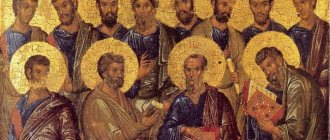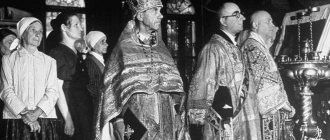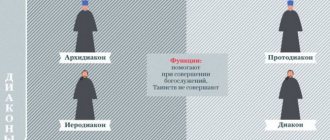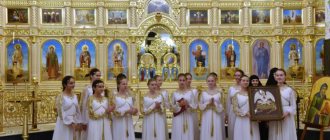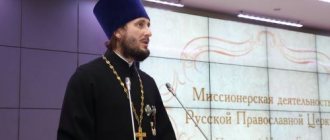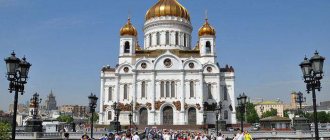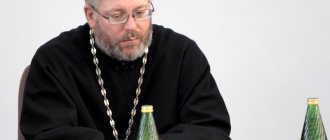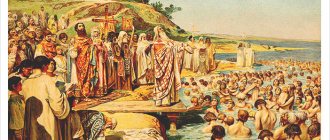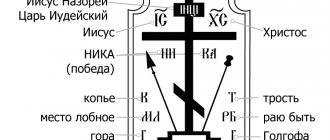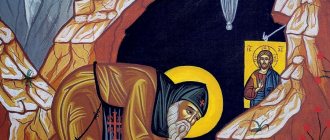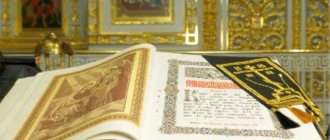The history of the formation of Orthodoxy in Rus' is inextricably linked with a number of individuals who dedicated their lives to the true worship of God and the fulfillment of all Divine laws. Strictly following the requirements of their religion, these people deserved Divine grace and the title of Orthodox saints for their selfless service to the Almighty and intercession for the entire human race before him.
The list of godly personalities who became famous for righteous deeds or who suffered for the faith of Christ is truly inexhaustible. Nowadays, it is also replenished with new names of pious Christians canonized by the church. The acquisition of holiness by ascetics of spiritual improvement can be called a great work, coupled with the burden of overcoming base feelings and vicious desires. Creating the Divine image in oneself requires enormous effort and painstaking work, and the feat of Orthodox saints awakens admiration in the souls of true believers.
On icons depicting the righteous, their heads are crowned with a halo. It symbolizes the grace of God, illuminating the face of a person who has become a saint. This is God's gift, warming the soul with the warmth of spirituality, delighting the heart with Divine radiance.
Could the holy fathers be wrong?
The Holy Fathers are recognized teachers in both the field of moral and dogmatic teaching of the Church. However, in their writings there are erroneous ideas regarding certain theological issues.
As a rule, this is due to the fact that in some cases they spoke out as faithful witnesses of the teaching that the Church has always preserved and professed, and in others they expressed their personal opinion.
St. Seraphim of Sarov: “When I spoke on my own, it happened that I was mistaken, but when I gave space to God, there were no mistakes.”
The Church, as the pillar and ground of the truth (1 Tim. 3:15), does not make mistakes. Individual Christians are not immune from mistakes. A Christian's personal point of view may be wrong.
Before John of Damascus
| Father of the Church | Date of death | Notes |
| Hadrian, monk of Antioch | 5th century (estimate)[1] | wrote a manual on the Antiochene method of exegesis of Scripture[2] |
| Alexander of Alexandria[3] | 326 or 328 | |
| Alexander Lycopolis | 4th century | |
| Ambrose of Milan | 397 | one of the Four Great Doctors of the Western Church; categorically against Arianism |
| Amphilochius of Iconium[2][3] | 403 or earlier | |
| Anania Shiraksky[3][4] | 685 | wrote a paper for Christmas and one for Easter |
| Anastasy Sinaita[2][3] | 7th century | |
| Andrew of Caesarea[2] | 637 | commented on Apocalypse |
| Andrey Kritsky[3] | 712, 726 or 740 | author of the 250-stanza Grand Canon |
| Anthony the Great[2] | 356 | |
| Aphraates | 345 | Mesopotamian bishop, author of 23 sermons[2] |
| Apollinaris of Hierapolis | between 177-180 | |
| Apollinaris of Laodicea | 382 | |
| Apollonius of Ephesus | 210 | |
| Archelaus (Bishop of Carra) | 3rd century (beginning) | presumably the Bishop of Karchar, who wrote against Manichaeism |
| Aristides of Athens[2][3] | 134 | |
| Aristo Pella[2] | 160 | |
| Arnobius[2] | 330 | author Against the Pagans |
| Arseny the Great | 445 | |
| Apringius Beji | 6th century | commented on Apocalypse [5] |
| Asterius of Amasea[3] | 410 | wrote sermons on morality, including topics such as divorce and self-interest, as well as the parables of Jesus Christ |
| Afanasy | 373 | one of the Four Great Doctors of the Eastern Church |
| Athenagoras of Athens[2] | 190 | wrote in defense of the resurrection of the dead[3] |
| Atticus[2] | 420s | |
| Augustine of Hippo | 430 | one of the Four Great Doctors of the Western Church ( Doctor Gratiae ) |
| Aurelius Prudentius[2][3] | 413 | commented on Psalms [6] |
| Ausonium | 395 | |
| Avit Vienna[2] | 518 | author of the five-book poem De Spiritis Historiae Gestis; converted King Sigismund; fought Arianism |
| Barnabas[3] | 061 | wrote one message |
| Barsanufius of Palestine | 540 | |
| Basil the Great of Caesarea | 379 | one of the Four Great Doctors of the Eastern Church and one of the Three Saints; father of monasticism |
| Trouble[2] | 735 | Doctor of the Church and author of An Ecclesiastical History of the English People |
| Benedict of Nursia[2][3] | 547 | best known for the Rule of Saint Benedict |
| Boethius[3] | 520s | author of The Consolation of Philosophy |
| Braulio of Zaragoza | 651 | commented on Psalms [6] |
| Caesarius of Arles[2] | 542 | commented on Apocalypse |
| Kai | 3rd century | |
| Cassiodorus[2][3] | 585 | |
| Chromatius[3] | 407 | wrote sermons on the Gospel of Matthew |
| Clement of Alexandria | 215 | |
| Clement of Rome | 099 | |
| Caelius Sedulius[2] | 5th century | |
| Columba from Iona[2][3] | 597 | |
| Commodian | 3rd century | |
| Cyprian of Carthage[2] | 258 | |
| Kirill of Alexandria | 444 | Doctor of the Church ( Doctor Incarnationis ) fought the Nestorian heresy |
| Cyril of Jerusalem | 386 | Doctor of the Church who wrote detailed instructions to catechumens and baptized Christians[2] |
| Pope Damasus I | 384 | |
| Didim Blind[2] | 398 | teacher Jerome and Rufinus; follower of Origen; opponent of Arianism and Macedonian heresy; works condemned by the Fifth Ecumenical Council and the Sixth Ecumenical Council |
| Diodorus of Tarsus[2] | 390 | |
| Dionysius of Corinth[2] | 2nd century | |
| Pope Dionysius[2] | 268 | fought Sabellianism |
| Dionysius the Areopagite | 96 | It is believed that the writings attributed to him were forged by Pseudo-Dionysius the Areopagite. |
| Pope Dionysius the Great of Alexandria | 265 | |
| Ephraim the Syrian | 373 | Doctor of the Church |
| Epiphanius of Salamis | 403 | friend Jerome who is strongly opposed to Origenism and wrote a history of heresies |
| Eucherius of Lyons[2][3] | 449 | |
| Eugippius[4] | 535 | |
| Eusebius of Caesarea | 339 | |
| Eusebius of Emesa | 360 | commented on Genesis [7] |
| Eusebius Vercelli[2] | 371 | |
| Firmilian[2] | 269 | |
| Fulgentius of Ruspe | 527 or 533 | |
| Guy Mari Victorin | 4th century | fought Arianism[2] |
| Gennady of Massiliysky[2] | 496 | |
| Pope Gregory I the Great | 604 | one of the Four Great Doctors of the Western Church and author of Dialogues |
| Gregory of Nazianzus | 389 | one of the Four Great Doctors of the Eastern Church; one of three Orthodox saints awarded the title "Theologian"; one of the Three Saints |
| Gregory of Nyssa | 395 | |
| Gregory of Tours[3] | 594 | |
| Gregory Thaumaturge | 270 | |
| Hegesippus of Palestine[2] | 180 | a Jewish convert who fought Gnosticism and Marcionism |
| Hermias[3] | 3rd century | |
| Hesychius of Jerusalem | 5th century | |
| Hilary Poitier | 367 | Doctor of the Church |
| Hippolytus of Rome[2][3] | 235 | |
| Ignatius of Antioch | 108 | |
| Irenaeus | 2nd (late) or early 3rd century | |
| Isaac of Nineveh | 700 | ascetic author of many spiritual sermons, commentator on the Psalms [6] and made a significant contribution to Syrian piety; was not Christologically Nestorian[8] |
| Isidore of Pelusia | 450 | author of 2000 letters dealing primarily with allegorical exegesis[2] |
| Isidore of Seville[2][3] | 636 | Doctor of the Church |
| Jacob Sergius[4][6][9] | 521 | aka Mar Jacob |
| Jerome | 420 | one of the Four Great Doctors of the Western Church |
| John Cassian[2][9] | 435 | |
| John Chrysostom | 407 | one of the Four Great Doctors of the Eastern Church and one of the Three Saints |
| John Climacus[9] | 649 | |
| John of Damascus | 749 | Doctor of the Church and author of an accurate exposition of the Orthodox faith, ascetic and exegetical writings and hymns; Peter Lombard based his Four Books of Sentences on the works of John of Damascus and Thomas Aquinas based his Summa Theologica on Peter Lombard's Phrases |
| Julian Pomerius[2] | between 499-505 | author of De Vita Contemplativa regarding Christian holiness |
| Julius Firmicus Maternus | 4th century | |
| Justin Martyr | 165 | |
| Juvencus[2] | 4th century | |
| Lactantium | 325 | |
| Pope Leo I the Great | 461 | Doctor of the Church |
| Leontius of Byzantium[2] | 543 | |
| Lucian of Antioch[2] | 312 | |
| Lucifer[2] | 370 | Arianism was fought and defended by Athanasius at the Council of Milan in 354. |
| Macarius of Alexandria[9] | 395 | |
| Macarius of Egypt[9] | 391 | |
| Malchion | 3rd century? | played a key role in the deposition of Pavel Samosatsky |
| Marcus Minucius Felix[2][9] | 250 | author Octavian |
| Marius Mercator | 451 | made a compilation on Nestorianism and another on Pelagianism[2] |
| Martin Bragi | 580 | commented on Psalms [6] |
| Martin Toursky[9] | 397 | |
| Mathetes | 2nd century? | author of the Epistle to Diognetus |
| Maxim Turinsky[2] | 465 | |
| Maxim the Confessor[2][9] | 662 | |
| Meletius of Antioch[9] | 381 | |
| Melito of Sardis | 180 | author of an important sermon entitled On Easter about the Resurrection of Jesus Christ |
| Methodius of Olympia[2][9] | 311 | fought Origenism |
| Moses of Horene | 490 | author History of Armenia |
| Nectarius of Constantinople[9] | 397 | |
| Nikita Remeziansky | 414 | then the patron saint of Romania commented on the Psalms [6] |
| Neil of Sinai | 430 | |
| Nonnus | 5th century | |
| Novatian[2] | 258 | commented on the Psalms[6] |
| Ocumenius | 6th century | the Apocalypse that has come down to us [5] |
| Optatus | 4th century | fought Donatism[2] |
| Origen of Alexandria | 254 | posthumously anathematized at the Fifth Ecumenical Council (533) |
| Orosius[2] | 418 | |
| Pachomius[2][9] | 348 | Father of the Christian hostel of monasticism |
| Pacian Barcelona[9] | 391 | fought Novatianism |
| Palladium of Elenopol[2][9] | 420s | |
| Pamphilus of Caesarea | 309 | |
| Panten | 200 | first glorified the Alexandrian catechetical school[2] |
| Papias[9] | 163 | disciple John the Evangelist and Ariston[2] |
| Patrick[9] | 5th century | |
| Paulinus of Nola[9] | 431 | |
| Peter Chrysologist | 450 | Doctor of the Church |
| Pope Peter of Alexandria | 311 | |
| Philip priest | 5th century (dates unknown) | Meet Jer,[10] commented on the Book of Job |
| Philoxenus of Hierapolis[4] | 6th century | author of 13 ascetic speeches that fought Nestorianism, Manichaeism, and Marcionism |
| Poem | 450 | commented on Psalms [6] |
| Polycarp | 156 | Wrote one letter to the Philippians |
| Proclus of Constantinople | 440s | |
| Prohaeresius[2] | 368 | |
| Prosper of Aquitaine[2] | 455 | |
| Pseudo-Dionysius Areopagite | 6th century | author of Divine Names , Mystical Theology , Celestial Hierarchy , Church Hierarchy , and the defunct Theological Essays ; widely quoted in the Summa Theologica of Thomas Aquinas |
| Athenian Square[2] | 129 | wrote a non-existent apology to Emperor Hadrian |
| Rabbula[4][11] | 435 | ascetic and energetic Bishop of Edessa and ally of Cyril of Alexandria who opposed the heretical teachings of Nestorius |
| Romanos Melodist[11] | 556 | |
| Sahdona | 649 | commented on Psalms [6] |
| Salvian[2][11] | 490 | Gallic Author On the Government of God |
| Severyan Gabalinsky | between 408 and 425 | commented on Genesis [7] and 1st and 2nd Corinthians |
| Severus of Antioch[4][11] | 538 | |
| Sextus Julius Africanus[2][9] | 240 | |
| Sidonius Apollinaris[2][11] | 489 | |
| Socrates of Constantinople | 439 | |
| Sophrony[11] | 638 | |
| Sozomen | 450 | |
| Sulpicius Severus[11] | 425 | student and biographer Martin of Tours and author of Ecclesiastical History [2] |
| Synesius Sirensky[2][11] | 414 | |
| Tatian | 185 | |
| Tertullian | 240 | Montanist, First of the Latin Fathers, died |
| Theodore of Mopsuestia[2] | 428 | commented on the Acts of the Apostles and First and Second Corinthians |
| Theodoret Cyrus | 458 | successor Eusebius of Caesarea[2] |
| Theodotus of Ancyra | 5th century | |
| Theophilus of Antioch[2] | Between 183–185 | first writer known to have used the term Trinity to describe the Father, the Son, and the Holy Spirit |
| Teotimos | 407 | |
| Tikhony | 390 | commented on Apocalypse ; his seven principles of interpretation from his Book of Rules inspired by Augustine of Hippo [5] |
| Tyranny Rufinus | 410 | friend Jerome and successor Eusebius of Caesarea[2] who commented on the Psalms [6] |
| Valerian Cimier | 460 | commented on Psalms [6] |
| Venantius Fortunatus | 600 or 609 | wrote a poem about Easter |
| Victor of Antioch | 5th century (end) - beginning of 6th century | contemporary John Chrysostom,[12] commented on the Gospel of Mark[2] |
| Victorin from Pettau | 303 | author of On the Creation of the World and Commentary on the Apocalypse of Blessed John |
| Vincent Lerinsky | 450 | |
| Zeno of Verona | 371 | |
| Papa Zephyrin | 217 | commented on the Psalms |
Is it possible to read the so-called “holy fathers-hereseologists”? Aren't they heretics?
On the contrary, “heresologists” are those holy fathers and teachers of the Church who fought against heresies: St. Irenaeus of Lyons, Hippolytus of Rome, Epiphanius of Cyprus, Clement of Alexandria and others.
As for the heresiarchs, their creations are not a secret; they are easily accessible for scientific or missionary purposes. As for curiosity, does it make sense to waste time on spiritually harmful reading if there is a sea of spiritually beneficial things?
Patericon - what is it?
Separately, it is necessary to say about the Patericon - which can also be classified as patristic literature. These books—for example, the Great Patericon, the Palestinian Patericon, or “The Spiritual Meadow”—are a collection of short tales about the saints of the early Christian Church.
Sometimes it’s just one paragraph about some old man, sometimes it’s several stories about him. Some of the saints in these patericons are completely nameless, but all these stories are wonderful examples of holiness and Christian wisdom.
Some monasteries, including Russian ones, also have their own Patericon. For example, the patericon of the Holy Trinity Sergius Lavra, which describes the lives of all the saints who shone in this monastery. And of course - the Kiev-Pechersk Patericon, which contains the lives of hundreds of Kiev-Pechersk saints. Their lives spanned almost one century (!) and all their relics are now stored and open for worship in the caves of the Kiev-Pechersk Monastery.
Is it possible to call a priest “holy father”?
Such an appeal to priests is not accepted in the Orthodox Church. We call canonized saints holy fathers. You can say, for example: “The Holy Fathers teach...” or “The Holy Fathers established such and such rules regarding fasting...”. The accepted address to a living priest is: “father + <name>”, for example “Father Peter”, “Father Sergius”, etc.
***
Metropolitan Hilarion (Alfeev): “What is the most applicable of the heritage of the fathers for modern life? Preserving oneself in this constantly changing world, preserving the ideals and principles of Christian life in everyday life. Every day, every hour puts us before a moral choice: to act according to the commandments or according to the spirit of this world. This is where we need to apply the experience of the holy fathers in order to protect our souls from temptations. This is what is most applicable.”
prot. Georgy Florovsky: “It is not enough to simply select quotes, taking them out of context and ignoring the circumstances under which this or that essay was written. Many of the “sayings of the Fathers” have a specific polemical orientation: they, pronounced “on occasion,” must be used with the greatest caution and accuracy. We can establish the true meaning of each remark only from the context, taking into account the author’s holistic worldview.”
List of pious righteous people who received the rank of sainthood in the 20th century
| Name of a great Christian | Sainthood status | Brief information about the canon | Day of Remembrance | Years of life |
| John of Kronstadt (John Sergiev) | Righteous | In addition to preaching and spiritual writing, Father John healed the hopelessly sick and was a great seer | 20th of December | 1829-1909 |
| Nikolai (Ioann Kasatkin) | Equal to the Apostles | The Bishop of Japan was engaged in missionary work in Japan for half a century, spiritually supporting Russian prisoners | February 3rd | 1836-1912 |
| Vladimir (Vasily Bogoyavlensky) | Hieromartyr | The activities of the Metropolitan of Kyiv and Galicia were associated with spiritual enlightenment to strengthen Orthodoxy in the Caucasus. Accepted martyrdom during the persecution of the church | The 25th of January | 1848-1918 |
| Royalty | Passion-bearers | Members of the royal family, led by Emperor Nikolai Alexandrovich, who suffered martyrdom during the revolutionary coup | 4th of July | Canonization was confirmed by Russia in 2000 |
| Tikhon (Vasily Belavin) | Saint | The life of His Holiness the Patriarch of Moscow and All Rus' was connected with the glorification of the faces of saints. The confessor was a missionary in America, spoke out against the persecution of the Orthodox Church | March 25 | 1865-1925 |
| Silouan (Simeon Antonov) | Reverend | Having left the monastic path, he served in the army, where he supported his comrades with wise advice. Having taken monastic vows, he retired to the monastery to gain ascetic experience in fasting and prayer. | 11 September | 1866-1938 |
In Orthodox literature there is a special genre that describes the life and exploits of people who lived in holiness. The lives of saints are not secular chronicles, but life stories written in accordance with church canons and rules. The first records of events in the lives of holy ascetics were kept at the dawn of Christianity, then they were formed into calendar collections, lists of days of veneration of the blessed memory of saints.
According to the instructions of the Apostle Paul, preachers of the word of God should be remembered and their faith should be imitated. Despite the departure to another world of the holy righteous, whom the holy church reveres.
For high morality and holiness throughout the history of Orthodox Rus', people with a pure heart and a radiant soul were gifted with God's grace. They received the heavenly gift of holiness for their righteous deeds, their help to people living on earth is invaluable. Therefore, even in the most hopeless situation, go to church, pray to the saints, and you will receive help if the prayer is sincere.
Third Ecumenical Council
It was convened in 431 in Ephesus, under Emperor Theodosius 2nd the Younger. The council was convened against the false teaching of the Archbishop of Constantinople Nestorius, who wickedly taught that the Most Holy Virgin Mary gave birth to the simple man Christ, with whom, then, God united morally, dwelt in Him as in a temple, just as He previously dwelt in Moses and other prophets . That is why Nestorius called the Lord Jesus Christ Himself a God-bearer, and not a God-man, and called the Most Holy Virgin Christ-bearer, and not the Mother of God. 200 bishops were present at the Council.
The Council condemned and rejected the heresy of Nestorius and decided to recognize the union in Jesus Christ, from the time of the Incarnation, of two natures: Divine and human; and determined: to confess Jesus Christ as perfect God and perfect Man, and the Blessed Virgin Mary as the Mother of God. The Council also approved the Niceno-Tsaregrad Creed and strictly forbade making any changes or additions to it.
First Ecumenical Council.
Saints Nicholas the Wonderworker and Spyridon of Trimifuntsky
318 bishops took part in the work of the Council, among whom were: St. Nicholas the Wonderworker, James Bishop of Nisibis, Spyridon of Trimythous, St. Athanasius the Great, who was at that time still in the rank of deacon, etc.
The Council condemned and rejected the heresy of Arius and affirmed the immutable truth - the dogma: the Son of God is the true God, born of God the Father before all ages and is as eternal as God the Father; He is begotten, not created, and is of one essence with God the Father.
So that all Orthodox Christians could accurately know the true doctrine of the faith, it was clearly and concisely stated in the first seven members of the Creed.
At the same Council, it was decided to celebrate Easter on the first Sunday after the first spring full moon, it was also determined that priests should be married, and many other rules were established.
At the first Ecumenical Council, the sequence and primacy of the Christian Churches was approved - the Roman See (the former reigning city), Constantinople (the reigning city), Alexandria, Antioch. The priority of the Church was given according to the place of rule of the sovereign of the Empire, which to this day prevents modern Catholics from proving that the Pope is the head of the entire Christian Church.
